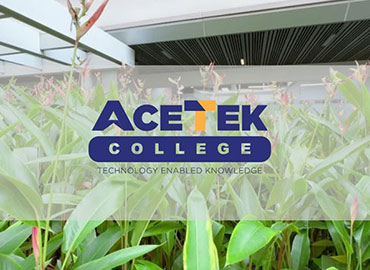
Diploma in Business (Information Technology)
Course Synopsis:
The Diploma in Business (Information Technology) program is designed to equip students with a comprehensive understanding of the intersection between business principles and modern information technology practices. Through a combination of theoretical knowledge and practical applications, students will gain insights into various facets of business operations and management in the digital era. This program emphasizes critical skills such as academic and research abilities, effective communication, operational efficiency, digital marketing, e-commerce strategies, IT applications, and customer relationship management. Furthermore, students will engage in industrial attachment to apply their learning in real-world scenarios, fostering a holistic understanding of business in the digital landscape.
Course Objectives:
On completion of the course, learners will be able to:
- Develop critical thinking, analytical, and research skills essential for academic inquiry and business decision-making, alongside proficiency in effective communication techniques for professional interactions and collaboration.
- Acquire a comprehensive understanding of fundamental business operations principles, retail management strategies, and e-commerce fundamentals, including the ability to apply operational management techniques and design effective e-commerce strategies.
- Gain insights into digital marketing technologies, IT applications, and customer relationship management, enabling them to utilize modern communication technologies, analyze digital marketing campaigns, and implement IT solutions to address business challenges.
- Apply theoretical knowledge and practical skills acquired throughout the program to real-world business scenarios, demonstrating the integration of business and IT concepts in solving complex problems and achieving organizational objectives.
Modules:
1. Academic and Research Skills:
In this module, students will develop critical thinking and analytical skills essential for academic inquiry and research, leveraging technology tools and platforms. They will acquire proficiency in conducting literature reviews, data analysis, and synthesizing information for effective business decision-making using digital research databases and analytical software. Additionally, students will learn academic writing and referencing techniques to communicate ideas clearly and persuasively, utilizing digital writing and citation management tools.
2. Business Communication
This module focuses on developing oral and written communication for professional interactions, leveraging modern technologies. Cultivate effective interpersonal skills for collaboration and conflict resolution within a business environment.
3. Business Operations
This module focuses on developing proficiency in oral and written communication techniques essential for professional interactions within a business environment, incorporating technology-driven communication methods. Students will cultivate effective interpersonal skills for team collaboration and conflict resolution, utilizing collaborative digital platforms and virtual communication tools. They will also learn to utilize modern communication technologies such as video conferencing and presentation software for business correspondence and presentations.
4. Retail Business Management
This module provides insights into the dynamic world of retail business management, integrating technology solutions for enhanced operational efficiency and customer experience. Students will gain knowledge about merchandising, inventory management, and customer service in the retail industry, utilizing retail management software and customer relationship management systems. They will develop strategies for retail business growth, including location selection, pricing optimization, and promotional activities, leveraging data analytics and retail analytics tools. Moreover, students will learn to implement best practices in retail operations to enhance profitability and customer satisfaction through the integration of technology-driven solutions.
5. E-Commerce and Online Business
In this module, students will explore the fundamentals of e-commerce, leveraging technology for the development and management of online business platforms. They will learn about website development, payment systems, and security protocols, utilizing e-commerce platforms and content management systems. Students will evaluate different models of online businesses and understand their implications for marketing, sales, and customer engagement, employing digital marketing analytics tools and e-commerce analytics platforms.
6. Digital Marketing Technology
Digital marketing plays a pivotal role in contemporary business environments, with technology as its backbone. In this module, students will understand the significance of digital marketing and explore various channels such as social media, search engine optimization, and content marketing, utilizing digital marketing platforms and analytics tools.
7. IT Applications
Proficiency in using common business software applications is essential for effective data management, analysis, and presentation, with a focus on technology integration. In this module, students will be introduced to enterprise resource planning (ERP) systems and data visualization tools.
8. Customer Relationship Management
Customer relationship management (CRM) is critical for business success, with technology playing a central role in its implementation. In this module, students will understand the importance of CRM and its role in attracting, retaining, and satisfying customers, utilizing CRM software tools and customer data platforms.
9. Project
Participation in an industrial attachment is mandatory and forms an essential component of the course. In the event that a student is unable to secure a suitable internship due to circumstances beyond the college’s control, the alternative requirement will be the completion of a Project Work (Project in lieu of IA will be of 3 months duration).
Course Structure:
| Mode of Delivery: | Face to Face Delivery | |
| Teacher to Student Ratio: | 1:45 | |
| Duration: | Full Time: 12 months (6-month Institution + 6-month Industrial Attachment) | |
| Class Frequency: | 5 days per week x 3 hrs per day | |
| Total Contact Hours: | 288 total contact hours | |
| Attendance: | 75% (Local Students) 90% (Student Pass Holder) | |
| Assessment Method: | Students will be assessed by a variety of Assignments and Presentations | |
| Graduation Criteria: | Students who have successfully completed the course by passing every module will be awarded the Diploma in Business (Information Technology) by AceTek College. | |
Entry Requirement
| Local | International Students | |
| Minimum Age | 16 years | 16 years |
| Academic Qualification | 3 GCE ‘O’ Level credits (at minimum C6 Grade or equivalent) or equivalent qualifications may be recognized on a case-to-case basis, Or Mature candidates aged 30 years old and above with minimum 8 years working experience. | Completed 10 years of formal education Or Mature candidates aged 30 years old and above with minimum 8 years working experience |
| English Proficiency | C6 grade in GCE ‘O’ level English Or Pass Acetek English Placement Test | Pass in English language in year 10 or equivalent Or Passed AceTek’s English Placement Test |







